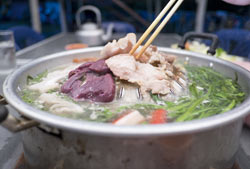Five Words in Thai that Are Hard To Explain in English
 Thai is a wonderful language to learn. It is especially important and beneficial to learn the language if you are living in Thailand long term, or are considering doing so in the future.
Thai is a wonderful language to learn. It is especially important and beneficial to learn the language if you are living in Thailand long term, or are considering doing so in the future.
As with any new language Thai has some really easy to grasp words and phrases and some that are really difficult to explain to anyone who isn’t Thai.
This page explores five words that are commonly used in the Thai language, but are quite difficult to translate into English.
ฝาก– faak
This word can mean two completely different things and it is sometimes hard to work out what somebody is asking or telling you. As Thai is a tonal language most words sound the same to the untrained ear, but are actually different words. ฝาก(faak) is an exception.
Usually ฝาก means ‘to deposit’. This could be anything from money in the bank to simply leaving bag with someone until you return. That part is simple enough.
The word ฝาก gets confusing when it is also used to ask if you would like something. For example you could ask somebody if they need anything from the shop using ฝาก, and in the same sentence use ฝาก to ask them if you can leave something with them whilst you go to the shop! This makes using the word ฝาก very confusing at the least.
สบายๆ – sabai sabai
One of Thailand’s favourites สบายๆ (sabai sabai) is used so often by Thai nationals you will probably hear it on a daily basis if you live in Thailand. It is a great phrase and sums up the Thai way of life and outlook on life.
The word สบายๆ (sabai sabai) means so much more than that.
We can say this term when everything is going well and you are relaxed. You could also say the phrase to someone if they are getting stressed to tell them to calm down. Similarly you could use it to say that everything happens in its own time (a little bit like the word ma?ana in Spanish)
สบายๆ is a great term, don’t be surprised if it is one of the first phrases that you start to use regularly in Thai.
กวนตีน kwung deen
Although it is a colloquialism originating in Isaan, in north-eastern Thailand,กวนตีน is commonly known and easily understood by all Thais. The only problem is explaining what it means to a foreigner!
The closest literal translation of กวนตีน is ‘mixing foot’, which makes no sense in English. The phrase really means that you are teasing somebody or stirring the pot (mixing).
Use the term jokingly only with friends due to it being slightly offensive, but if you say it to the right Thai at the right time you will have them in stitches with laughter.
ขี้- Kee
This is another Thai word that can have many different meanings, depending on its context.
The word ขี้ is an intensifier when describing a person’s characteristics. You could say somebody is ‘kee mao’ (a drunk) or ‘kee leum’ (forgetful) and, although it is an informal way of speaking, it is accepted throughout Thai society.
You have to be careful though as the word ขี้ can also be used to describe waste products, including human. You don’t have to be a linguistic genius to see that you could inadvertently offend somebody if this word is used in the wrong context!
 หมูกระทะ – Mookratah
หมูกระทะ – Mookratah
A fantastic dining experience in Thailand is to go to the local mookratah restaurant. Thais and foreign visitors alike love to eat mookratah, but what exactly is it?
A ‘kratah’ is a barbecue type bowl which can be used to grill meat and also has a channel to cook soup around the outside.
‘Moo’ means pork. Therefore a mookratah basically means a pork barbecue. As we don’t have anything like it in the West it is very difficult to describe a mookratah to a westerner. It is much better to go experience it first-hand.